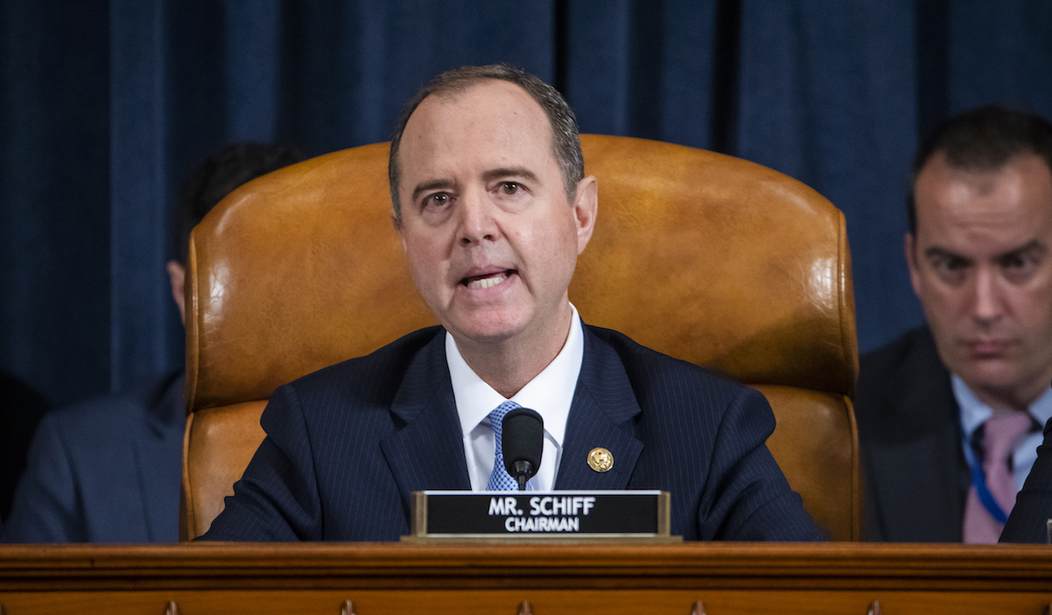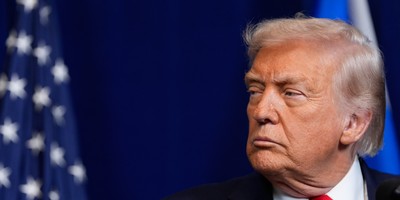House Intelligence Committee Chairman Adam Schiff, leader of the Democratic effort to impeach President Trump, told colleagues recently that impeachment is "an urgent matter that cannot wait."
Why? Why is it so urgent that Trump, who has been in office for nearly three years and will stand for re-election in 11 months -- why is it so urgent that he be impeached and removed this very moment?
The reasons probably have more to do with Democratic political priorities than with anything Trump has done or will do.
Schiff and Speaker Nancy Pelosi deny any political motive in impeaching the president. Perish the thought! Pelosi says Democrats are acting "sadly, prayerfully, [and] with a heavy heart." But they are racing to get the job done by Christmas. They're not even trying to hear from some key witnesses, like former National Security Adviser John Bolton, because they don't want to take the time to go to court over it.
The rush is because Democrats are running up against two very political deadlines.
The first is the approach of Democratic presidential caucuses and primaries.
The Iowa caucuses will be held on Feb. 3, and the New Hampshire primary on Feb. 11. As a practical matter, it will be very hard to get impeachment done by then.
Look at the example of Bill Clinton 20 years ago: The House voted articles of impeachment on Dec. 19, 1998. The Senate trial began on Jan. 7, 1999, and Clinton was acquitted on Feb. 12. It seems unlikely that House Democrats, who will ultimately have to deal with a Republican-controlled Senate, will be able to move any faster.
Recommended
Impeachment during the primaries creates multiple problems for Democrats. One is that it underscores, regardless of the disclaimers, the essentially political nature of this impeachment. The fact is, Democrats are impeaching the president in an election year with the goal of rendering him unelectable against the Democratic candidate. It doesn't get more political than that.
Then there is the practical problem impeachment creates for Democratic presidential candidates. At the moment, there are six Democratic senators running for president. Presumably, some will drop out by next February. But it seems likely that other senators, like top contenders Elizabeth Warren and Bernie Sanders, will still be in the running. Instead of campaigning, though, they will be chained to their desks in the Senate chamber in Washington for the duration of a Senate impeachment trial. That's not the best way for a candidate to spend the weeks leading up to caucuses and primaries.
The other reason for the Democratic rush is the potential for impeachment fatigue. Some recent polls have shown public support for impeachment leveling off and even tipping downward. The public has already been through years of the Trump-Russia investigation, culminating in this year's aborted effort by Democrats to impeach the president on the basis of the Mueller report. Then, in September, Democrats turned on a dime and sought to impeach him in the Ukraine matter.
Pelosi and her colleagues clearly saw impeachment as a winner; she declared an inquiry even before the White House released the transcript of the now-famous phone call between Trump and Ukrainian President Volodymyr Zelensky.
But something has happened since then. At the beginning of the Trump-Ukraine matter, the public mostly heard a narrative created by Democrats and their allies in the media. Trump had abused power, he had engaged in a quid pro quo, or bribery, or extortion, and he had jeopardized national security. It sounded bad. Support for impeachment grew.
Then came public hearings. Democrats got enormous exposure for their case against the president -- wall-to-wall coverage on the big three broadcast networks and all the cable news channels. And what did a significant portion of the public see? A bafflingly complicated tale of bureaucratic infighting, mostly about Ukraine. Is this what Democrats would remove the president for? Support for impeachment stopped growing.
As it turned out, the much-awaited hearings had exactly the opposite effect than Democrats hoped. Pelosi and Schiff wanted to create a compelling TV show to dramatize Trump wrongdoing. Millions of Americans would be won over. Instead, the public got something that a reasonably attentive viewer would have a hard time figuring out.
So now the quickie hearings are over and Schiff and his Intelligence Committee colleagues are at work -- prayerfully, no doubt -- on a report of their findings. That report will go to the House Judiciary Committee, which will swiftly draft articles of impeachment. Whatever articles the committee approves will then be sent to the full House for a vote.
By that time, Christmas will be fast approaching. If House Democrats make that deadline, and approve articles against the president, a Senate trial will follow after New Year's. And then will come Iowa.
So Schiff is rushing, rushing, rushing. (Yes, the House is on a Thanksgiving break, but the impeachment staff is hard at work.) Impeachment is "an urgent matter that cannot wait." Because politics demands it.
Byron York is chief political correspondent for The Washington Examiner.

























Join the conversation as a VIP Member